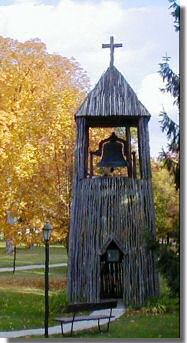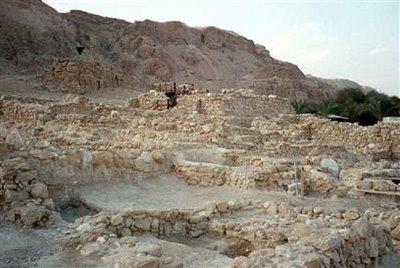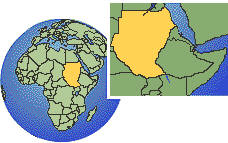The WandererI went out walkingthrough the streets paved with goldLifted some stonesSaw the skin and bonesOf a city without a soulI went out walking under an atomic skyWhere the ground won't turnAnd the rain it burnsLike the tears when I said goodbyeYeah I went with nothingNothing but the thought of youI went wanderingI went drifting through the capitals of tinWhere men can't walkOr freely talkAnd sons turn their fathers inI stopped outside a church houseWhere the citizens like to sitThey say they want the kingdomBut they don't want God in it
I went out ridingDown that ol' eight laneI passed by a thousand signsLooking for my own name
I went with nothingBut the thought you'd be there tooLooking for youI went out thereIn search of experienceTo taste and to touchAnd to feel as muchAs a man canBefore he repentsI went out searching, lookin' for one good manA spirit who would not bend or breakWho would sit at his father's right handI went out walking with a bible and a gunThe word of God lay heavy on my heartI was sure I was the oneNow Jesus, don't you wait upJesus, I'll be home soonYeah I went out for the papersTold her I'd be back by noon
Yeah I left with nothingBut the thought you'd be there tooLooking for you...Yeah I left with nothingNothing but the thought of you...I went wanderingI've enjoyed and learned a great deal from Robert Vagacs' new book,
U2 in Theological Perspective (
Vagacs). However, I'm not sure he does justice to this particular song, "The Wanderer." I'd like to offer some brief alternative readings of my own and also ask for readers' comments as to the meaning of the Wanderer for them.
Vagacs is surely on solid ground when he argues that the protagonist of the poem is wandering through "Zooropa," the modern world in cultural winter. As he says, the figure is on a "journey into the emptiness of Babylon" (p. 52), the world bereft of God, a "dystopia."
But Vagacs does not mention the similar journey taken by Qohelet, the writer of Ecclesiastes. Qohelet was on a God-project, a meaning-quest, whereas Vagacs argues the Wanderer does not actively search for spiritual meaning but "moves about aimlessly" (p. 52). Thus, Vagacs gives a pessimistic and negative reading of the figure's wandering rather than understanding him as one like Qohelet, involved in a project to lay out the ground-work for a faith-solution to finding meaning in life.
The relationship of the Wanderer with Ecclesiastes is fairly clear. According to Bono, that relationship is what made him think of Johnny Cash to sing the lead on the song: “Ecclesiastes is one of my favorite books,” says Bono. “It’s a book about a character who wants to find out why he’s alive, why he was created. He tries knowledge. He tries wealth. He tries experience. He tries everything. You hurry to the end of the book to find out why... There’s something of Johnny Cash in that.” One popular translation of Qohelet is "the preacher," and the Wanderer is about a preacher like Cash. Bono says, "Johnny Cash always left the line about cutting and running out. I always liked that. You know--bottle of milk, newspapers and he's off. He's got God's work to do. He's on tour."
In n. 30 on p. 53, Vagacs explicitly calls Bono's own understanding of the Wanderer overly "optimistic." He disagrees with Bono that "The song is definitely the antidote to the Zooropa manifesto of uncertainty." He does not see how Bono can say that "this track gives one possible solution." Interestingly, the faithful have often voiced just such doubts about the book of Ecclesiastes itself! Speaking of Ecclesiastes, H. Wheeler Robinson wrote, "The book has indeed the smell of the tomb about it." Fortunately, recent scholarship is often much more appreciative of Qohelet's theology.
The Wanderer is not aimless or prodigal, he's conducting wisdom-experiments, he's "looking for you." As Vagacs writes, "you" here is probably imagination---imagining God and the world interconnected, imagining transcendent meaning to life. The Wanderer goes out confident that "you'd be there too." The world, Zooropa, is bereft of God, but the Wanderer certainly is not. Certainly, he is on a "pre-repentance" experiment, but he promises Jesus "I'll be home soon."
Isn't the faithful thing to come home right now? No. Consider Bonhoeffer's Letters and Papers from Prison. There and then, it was not his time or season to be "home." From the Nazi Tegel prison in 1943 Bonhoeffer wrote, "When the time comes (but not before!) we may go to him with love, trust, and joy." "Sooner or later there will be times when [one] can say in all sincerity, 'I wish I were home.' But everything has its time, and the main thing is that we keep step with God, and do not keep pressing on a few steps ahead--nor keep dawdling a step behind. It's presumptuous to want to have everything at once."
Vagacs complains that the Wanderer is "powerless to break out of Zooropa" (p. 53), yet should this be his goal? Ecclesiastes 2:24 reads, "There is nothing better for mortals than to eat and drink and find enjoyment in their toil." In a post a few days ago, we looked at the metaphor of "eat and drink" as an expression of contentment in where God has placed us for the time being.
Martin Luther emphasized this as a key theological insight of Qoheleth: "Don't let the present moment, our moment, slip away," wrote Luther. No matter how strongly we might want to jump to the wonderful things God has in store for us in the future, we must not do it. "Do not desert the battlefield but stick it out."
Labels: U2, Video

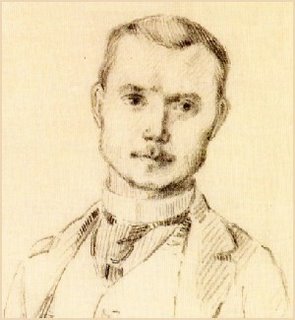


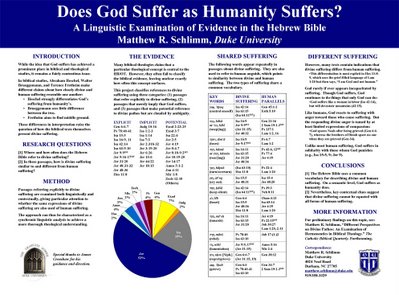
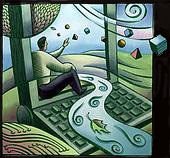

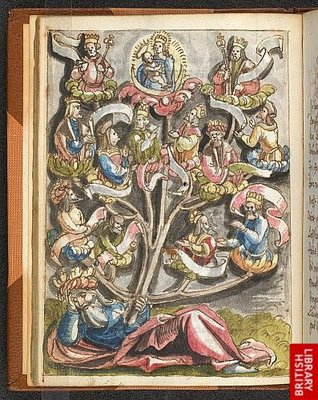



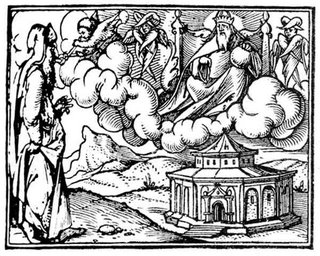 In Isa 6:1, recalling his commissioning, the prophet states, “I saw the Lord sitting on a throne, high and lofty (
In Isa 6:1, recalling his commissioning, the prophet states, “I saw the Lord sitting on a throne, high and lofty (

